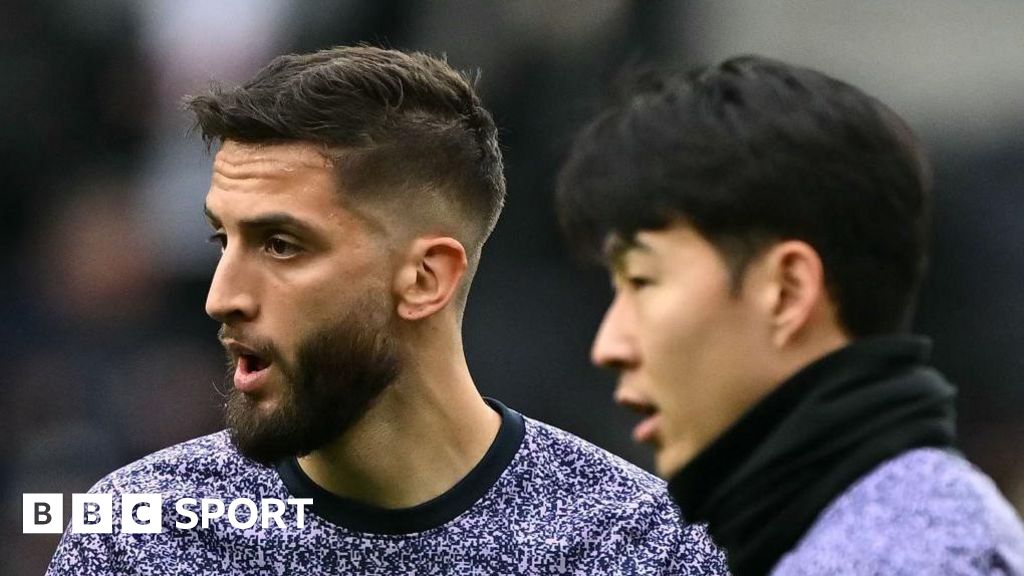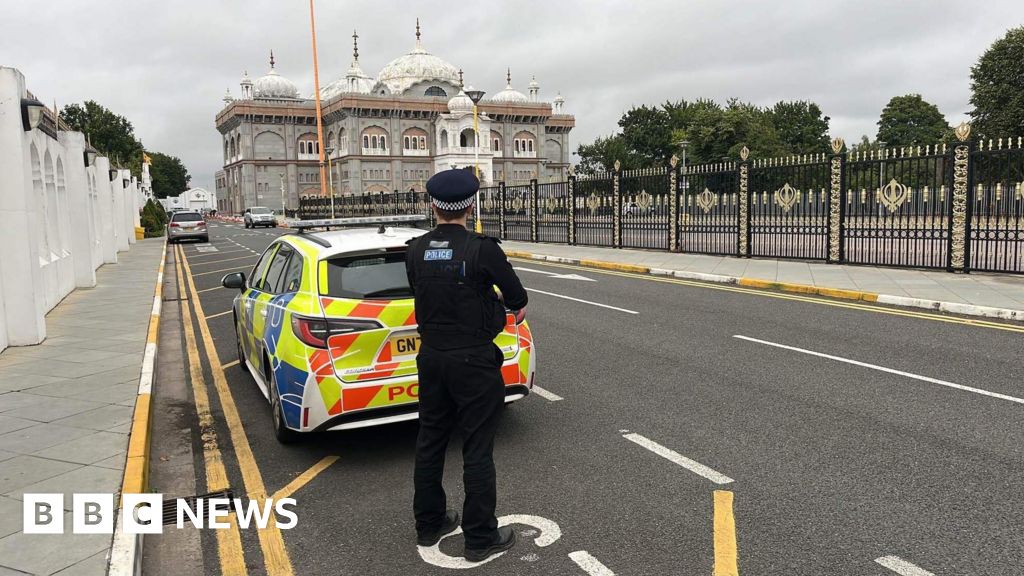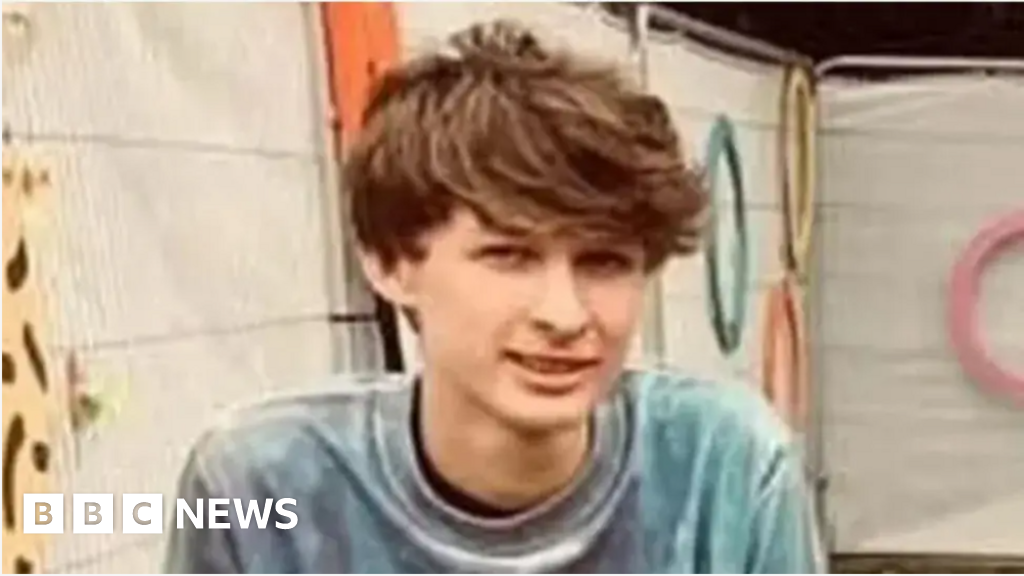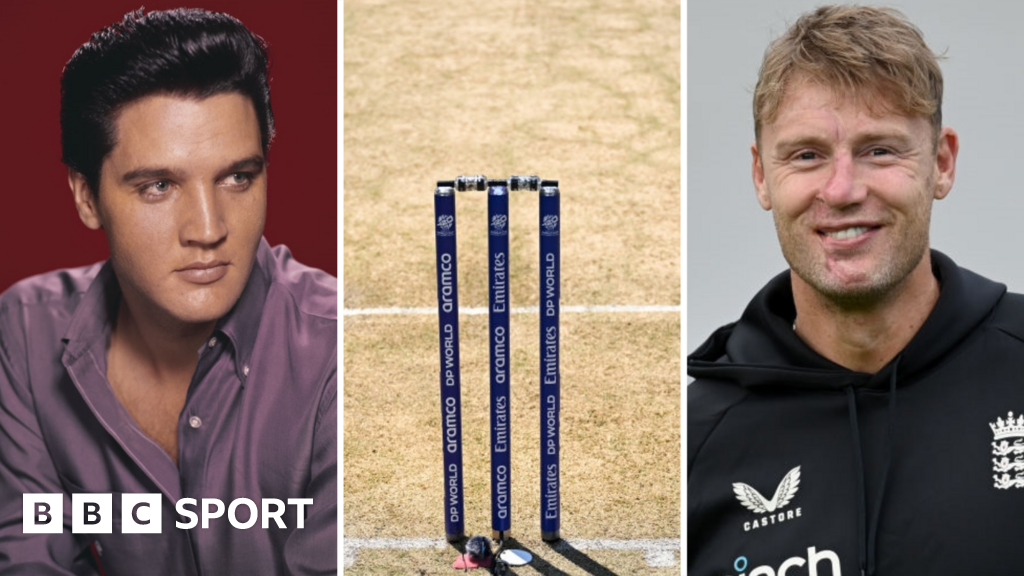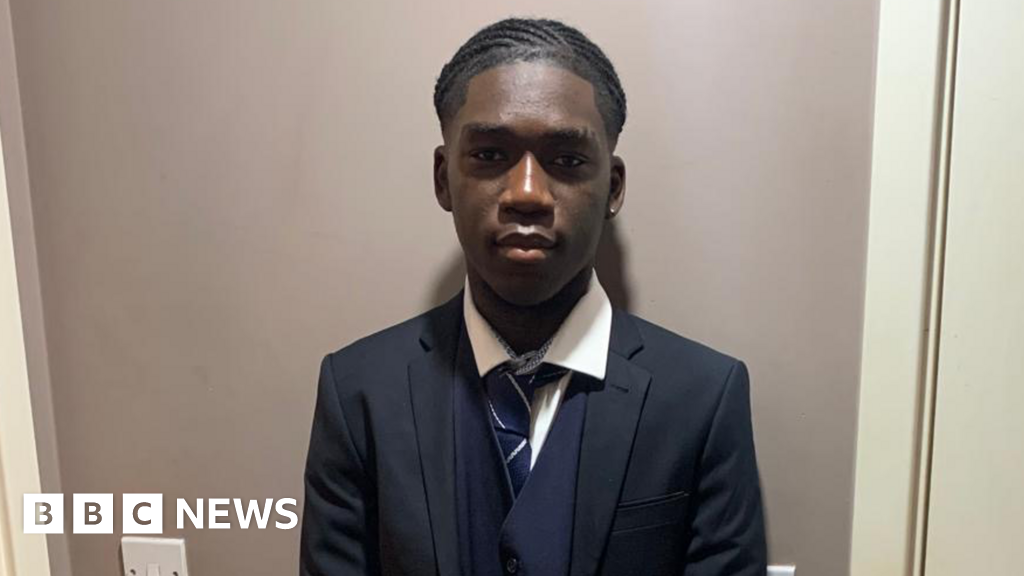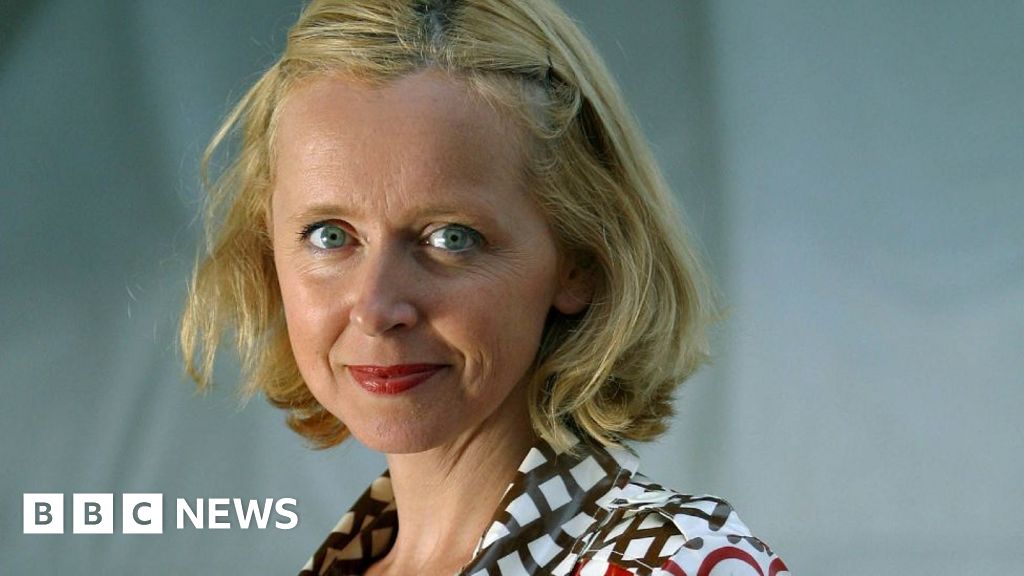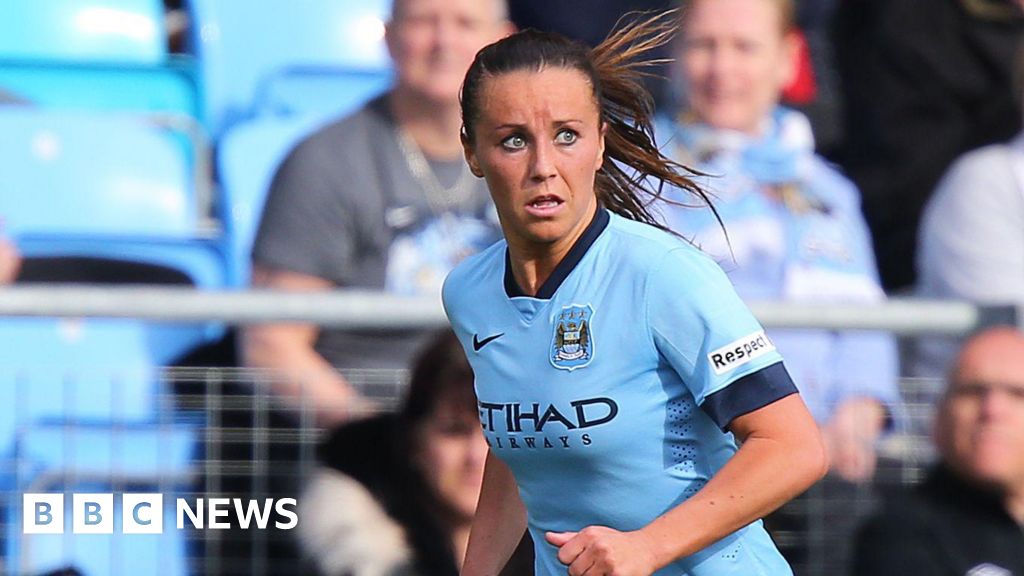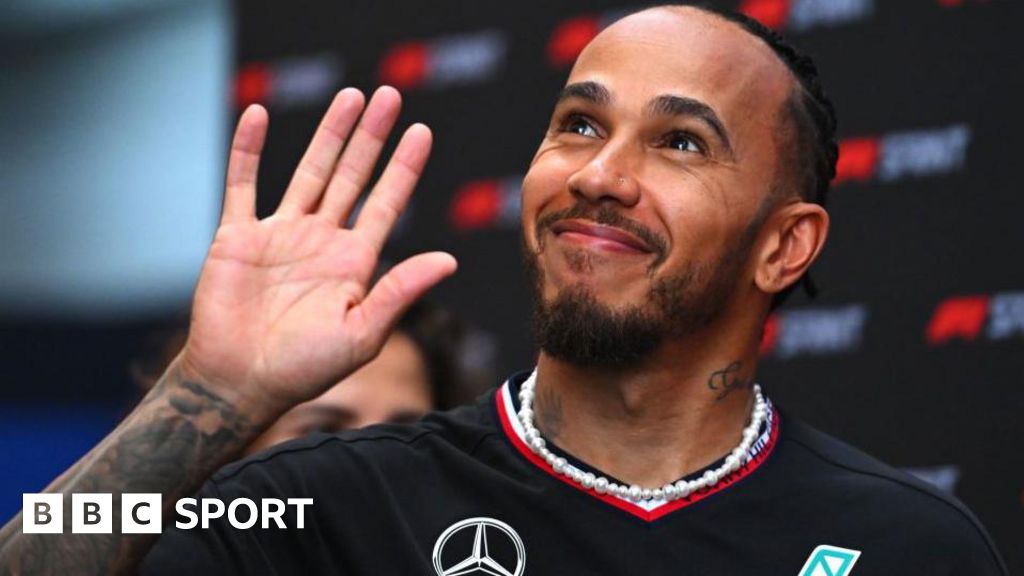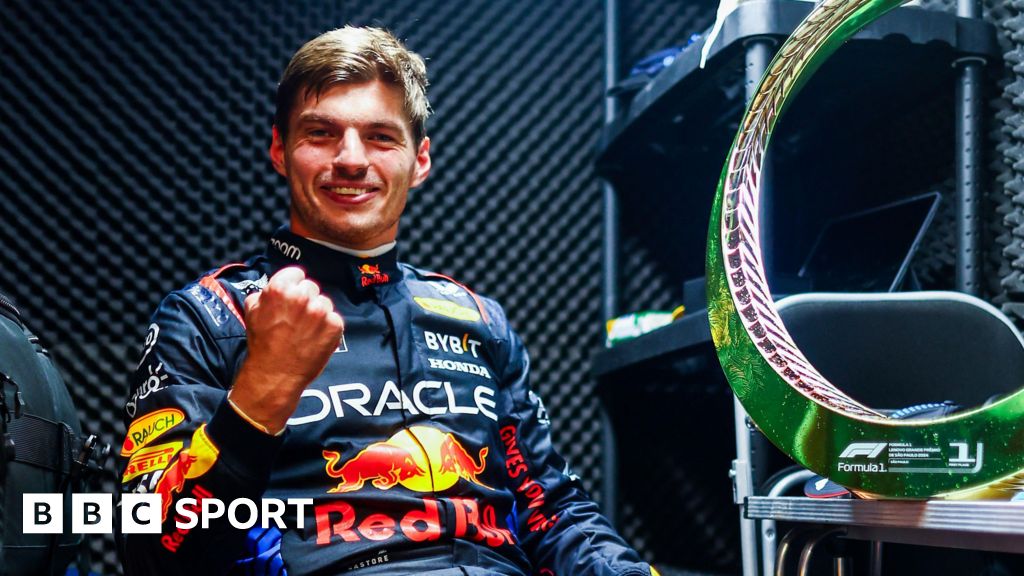Manchester United co-owner Sir Jim Ratcliffe was asked by BBC's Dan Roan about Erik ten Hag's future
Since Manchester United's dismal 3-0 defeat by Tottenham Hotspur at Old Trafford last month, Erik ten Hag's job had been in jeopardy.
After all, the Dutchman had presided over United's worst start to a Premier League campaign, despite the club spending more than half a billion pounds on signing players since Ten Hag’s arrival two years ago.
His tactics had not worked, and the players he brought in had mostly underwhelmed.
And so the manager's departure came as no surprise.
Three weeks ago, United co-owner Sir Jim Ratcliffe declined to back Ten Hag when I asked the Ineos billionaire if he still had faith in him.
Ratcliffe said he liked the coach, but ominously he also admitted there was a need to "take stock", and insisted responsibility lay with the executives that run the club on his behalf.
Ten Hag then survived a meeting of the club's hierarchy a few days later, and the October international break, but the sense was that he was on borrowed time. And so it proved.
Yet while few fans will mourn the decision to sack the manager, his departure also raises awkward questions for those in charge at Old Trafford.
Why - some may ask - did the club not act sooner, rather than allowing potential replacements such as Mauricio Pochettino and Thomas Tuchel to be snapped up elsewhere? Was it a case of admirable loyalty or a stubbornness that backfired?
Why did an end-of-season review in the summer - led by Ineos head of sport and former British Cycling performance director Sir Dave Brailsford - conclude it was right to stick with Ten Hag? Especially after United had come close to replacing him having approached several possible managers, a process that revealed their doubts, and may have undermined the Dutchman.
Yes, there was the impressive FA Cup final victory over Manchester City to consider, after Ten Hag had also led his team to the EFL Cup the previous season, along with support for the Dutchman from both fans and players.
But his team had still finished eighth in the Premier League, the club's worst season in the competition.
Despite that, the manager's contract was extended, a decision which now means United may have to pay more than £15m in compensation, according to several well-placed sources. United are refusing to comment on the cost of sacking Ten Hag, but such an outlay, along with the £200m that was spent on more new signings in the summer, will now come under intense scrutiny.
'On-field failure can no longer blamed on Glazers'
Image source, Getty Images
Image caption,The United delegation at Villa Park in October included co-owner Sir Jim Ratcliffe, Ineos head of sport Dave Brailsford, chief executive Omar Berrada, sporting director Dan Ashworth, technical director Jason Wilcox and former manager Sir Alex Ferguson.
Speaking in February, having just invested £1.25bn on a 27.7% stake in the club in a deal that saw Ineos take control of footballing affairs at United, Ratcliffe told BBC Sport that he was focused on changing the club, rather than the coach.
"If you look at this last 11 years, United has had quite a few coaches…no-one's been successful…so that would say to me that there's something wrong with the environment," Ratcliffe told me.
And yet, despite such sentiments, Ten Hag has been let go just eight months later.
The problem the manager faced was that the on-field failure could no longer be blamed on majority shareholders the Glazer family, or the structure surrounding him, because Ineos had taken control of footballing matters, with Ratcliffe overhauling the senior leadership.
Both chief executive Omar Berrada and sporting director Dan Ashworth joined United in July, after Ten Hag had been retained. But their decision to publicly afford the manager their unequivocal backing raised eyebrows at the time, and now seems even more curious. Did those words box them in, and make it harder to subsequently admit a mistake?
The silence and uncertainty surrounding Ten Hag's position following a seven-hour meeting of the club’s executive committee at Ineos' London headquarters three weeks ago did not help, with some critical of the way the saga has been played out in public.
BBC Sport has been told that alternatives to Ten Hag had been discussed at that meeting on 8 October, but that the club's hierachy still wanted to give the coach every possible chance of saving his job. However, some believe the situation could have been handled better.
"Why can't they have these meetings without anyone knowing where they are?" Sky Sports pundit and former United captain Roy Keane asked at the time.
"A couple of months ago everyone was saying, 'they've got new people coming on board, they’ll have all the answers, more money on recruitment', and United have gone backwards… I'm not sure I'm seeing proper footballing people who are making the right decisions for the club."
Redundancies & cost-cutting 'hard and difficult to see'
Many fans were excited by the fresh approach Ratcliffe promised when he arrived after years of decline under the unpopular ownership of the Glazers. But while he has recruited highly rated executives such as Berrada, Ashworth and technical director Jason Wilcox, there have also been casualties.
A restructuring of United led to a decision to cut 250 jobs, as part of a determination to slash costs, and save around £45m per year. Staff perks before last season's FA Cup final were stripped back. Not even Sir Alex Ferguson was safe from the cuts, with Ratcliffe's decision to axe his £2m ambassadorial salary also proving controversial.
Privately, United officials say such decisions have not been made lightly. The club had the highest employee count in the league.
But others at the club have hinted at a blow to morale and a loss of identity, arguing that poor recruitment around the first team in recent years has wasted far more money than will be saved by cutting the rank and file workforce. Veteran defender Jonny Evans said it was "hard and difficult to see... there's people you've known for 20 years", while former assistant manager Rene Meulensteen said the cost-cutting "needs some justification".
One former senior United executive - who wished to remain anonymous - told BBC Sport they had grave concerns about the new leadership's approach.
"They believed just because they were now in charge, things would be different," they told BBC Sport.
"Sustained sporting excellence is hard to find. My main issue isn't the sporting side which is volatile, it's the destruction of culture which underpins a meaningful sporting organisation.
"[It is a] cost of everything, value of nothing approach."
The new leadership at United can point to the £113m net losses that the club posted in its latest accounts in September as proof that a shake-up was desperately needed at Old Trafford.
That followed losses of £115.5m in 2021-22 and £42.1m in 2022-23. Some experts believe the club only avoided breaching Profit and Sustainability Rules (that limit losses to £105m over three years) because 'exceptional' costs caused by the impact of Covid and of last year's sale process were taken into account.
"We are working towards greater financial sustainability and making changes to our operations to make them more efficient, to ensure we are directing our resources to enhancing on-pitch performance," said Berrada at the time, hailing "transformative cost-savings and organisational changes".
But United failed to qualify for this season's expanded Champions League, and missing out on the competition again would prove even more costly.
The club's accounts revealed that its deal with kit manufacturer Adidas includes a clause that would mean a £10m penalty for every season they do not qualify for the competition.
During the year, Ratcliffe provided an injection of £153m, as was set out in his investment into the club, for infrastructure, including a revamp of the club's training complex. The billionaire is due to invest a further £76.5m by the end of the year.
He is also weighing up whether to pursue a £2bn plan for a new stadium, or to redevelop Old Trafford, with a final decision - potentially among the most important in the club’s history - expected by the end of the year. But some question how either project will be financed, amid a backlash at the suggestion that Ineos could seek public funds to help.
'Reviving Man United remains one of sport's greatest quests'
Such ambition initially raised expectations of a brighter future at the club. But, as Ratcliffe has admitted, on-field results must improve and, now that the decision to retain Ten Hag in the summer has been exposed as a mistake, there will inevitably be renewed focus on Ineos' record across their other sports teams.
French club Nice, which Ratcliffe bought in 2019, qualified for the Europa League last season. But in four full campaigns in charge, he is yet to see Nice finish higher than fifth in Ligue 1, and they have twice finished ninth. They are now on to their seventh manager under Ineos ownership.
Lausanne, meanwhile, bought by Ratcliffe in 2017, are eighth in the Swiss Super League, having been relegated twice during that period, before then gaining promotion on both occasions.
Despite one of the biggest budgets in cycling, Ineos Grenadiers have proved a shadow of the all-conquering Team Sky which Ratcliffe took over in 2019, with no major win for several years.
The billionaire has enjoyed more success in sailing where his Ineos Britannia boat reached the America's Cup - the first time a British team has been in the final since 1964, but then lost a one sided-final to holders New Zealand.
But it is at United that Ratcliffe and his executives will ultimately be judged when it comes to their investments in sport.
Perhaps the patience Ineos displayed with their sailing team influenced the decision to give Ten Hag time. Maybe the cost of sacking the manager was also a factor.
To be fair to Ratcliffe, back in February, he tried to temper expectations by warning that it could take three years before United were a true force again. The task, he said, was "not just a simple short-term fix. We have to walk to the right solution, not run to the wrong one."
Sadly for Ten Hag, there was a limit to the patience of his boss.
Reviving United and returning them to the top of English football has become one of sport's greatest quests.
Less than a year into their attempt at doing so, it is way too early to judge Ineos' record at Old Trafford, and to assess their strategy.
It is too soon to know whether the decision-making structure at the club - with the Glazers now shielded from scrutiny - will prove successful, or if tensions may emerge.
But some of the goodwill Ratcliffe and his executives enjoyed in their early months has been lost, and they are now under intense pressure to get their first managerial appointment right.
For the first time perhaps, they now realise the truly daunting scale of the challenge that confronts them.

 3 weeks ago
8
3 weeks ago
8
